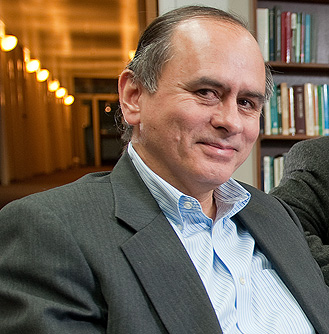Winners of 2010 President's Awards for Excellence Through Diversity to be feted today
Dr. Stephen Galli, chair of the Department of Pathology, will be honored. The Center for Comparative Studies in Race and Ethnicity also will be recognized.
A Medical School professor committed to equal opportunity for women and minorities among faculty, staff and trainees, and a center that has established a national reputation for scholarly research on race and ethnicity have each been chosen to receive a 2010 President's Award for Excellence Through Diversity.
President John Hennessy will confer the awards today, at a private reception.
They are the second set of recipients of the awards, which were established in 2009.

Stephen Galli, chair of the Pathology Department, was honored for his commitment to recruiting and promoting women and underrepresented minority faculty.
Stephen Galli, a professor of pathology and of microbiology and immunology who has been chair of the Pathology Department since 1999, was honored "for his leadership in increasing and supporting the diversity" of the department.
The citation said Galli had demonstrated a commitment to diversity "by recruiting and promoting women and underrepresented minority faculty" and "by educating search committees about diversity issues."
In addition, Galli was honored for "helping to form a Faculty Development and Diversity Committee within the department" and for "supporting nominations of women and minority faculty for leadership programs in the School of Medicine."
He was cited for "taking a strong public stand against discrimination and providing opportunities for discussion of cultural sensitivity, diversity and tolerance among all members of the department."
Finally, Galli was commended for "his commitment to equal opportunity for women and minorities among faculty, staff and trainees, so that Pathology has become a role model for other departments in the School of Medicine and Stanford University at large."
The Center for Comparative Studies in Race and Ethnicity, established in 1996, has infused ethnic studies – from domestic and international perspectives – with a new vitality through its research institute and its undergraduate teaching program.
The center draws on the intellectual interests of more than 100 affiliated faculty, representing 15 departments and programs and five different schools.

Sociology Professor C. Matthew Snipp has led the Center for Comparative Studies in Race and Ethnicity since 2008.
The center's research institute approaches the study of race, ethnicity and culture through new questions and research methods. The center also houses two interdepartmental undergraduate programs: the Program in Comparative Studies in Race and Ethnicity, which offers majors and minors in Asian American Studies, Chicana/o Studies, Comparative Studies in Race and Ethnicity and Native American Studies, and the Program in African and African American Studies, which also offers a major and minor.
The center, which has been led since 2008 by C. Matthew Snipp, a professor of sociology, was cited for "developing undergraduate curricula on topics focusing on people's identities, origins and cultures." (Snipp served as director of the center's undergraduate program from 2005 to 2009.)
The center also was honored for "fostering intellectual engagement and cross-pollination among students and enhancing their ability to communicate outside their specific disciplines."
The center was cited for "providing opportunities through its Public Policy Institute and service-learning initiative for students to obtain exposure to social policy issues of importance to communities of color."
In addition, the center was honored for "providing a welcoming environment to students of diverse backgrounds, identities and interests that encourages them to develop meaningful relationships with faculty and staff and fosters inclusion and empowerment."
The center also was commended for "stimulating intellectual give-and-take, sustained research interactions and interdisciplinary collaborations through the seminars, networks and fellows program of its Research Institute."
Finally, it was cited for "its exceptional contributions to increasing and sustaining the intellectual and demographic diversity of Stanford's student body and faculty."
The diversity awards, established in 2009, were developed to honor individuals and programs that have made exceptional contributions to enhancing and supporting diversity, broadly defined, at Stanford. Usually, two awards will be given each year: one to an individual among the faculty, students and staff; another to a campus unit, such as a department, program or office.
The annual awards were created to recognize contributions to diversity in many aspects of university life, including recruitment programs, mentoring efforts, curricular projects, staff development programs and community-building activities.

Share This Story